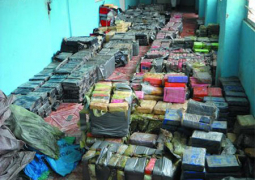The
Matchet's Diary
It is not a
new story when media houses and practitioners are often labelled pro-Western
the very moment they started to expose the cruel and inhuman treatments
governments and its agencies meted out on their citizens.
Or do they
want the civil societies to adopt their style of non-interference even in the
most egregious crime of genocide, mass disappearances, ethnic cleansing and
crime against humanity?
The popular
demand for democracy in this period of transition mainly focuses on the
development of mechanisms that will ensure changes in the governance structure,
as well as the operatives within these structures. This is especially [so]
given the existence, in closed societies, of repressive mechanisms that
restrict individual freedom and place greater emphasis on the so-called
"security" of the persons in government. Issues of transparency and accountability
should serve as the main priority with greater emphasis on individual freedom
and the open participation of the citizens in the process of governance. This
is the recipe for a democratic system. For how long do they want their citizens
to remain in bondage? One thing that has always occurred to my mind is; if
Africans are truly ready for democracy? Whenever I go out as an election
observer, seeing the queue whether long or short, the first thing I do is to
look straight at the faces of young people and women. From east, south, north
to west, these faces will actually tell you that they are tired and they want
changes and to note well that politicians are not very popular anywhere these
days. There is a lot of cynicism among the youth and teenagers, especially
about the present and the future. This cynicism grows out of apparent
hopelessness, frustration, bad examples and seeming hopelessness. With some
terrorist presidents controlling the barrels of the guns, it is very difficult
for their dreams of change to come true. What we have in today's Africa is nothing more than a bunch of political
hooligans that make kangaroo decisions and loot the nations' treasury;
honourable liars who build bridges where there is no river and terrorists who
clamp down onanyone that questions
their credibility.
Poor
economic policies and bad governance have sent thousands, if not millions of
the young, in search of greener pastures through the Atlantic coast and the
harsh Sahara desert to their untimely deaths.
One thing that bothers me most is that no-one, not even those who met this
hardship, is ready to tell our youth the truth about the harsh realities that
await them in their so-called search for greener pastures while coming through
Mungo Park. The lack of right leadership and political will is accountable for
the present food insecurity in Africa; unless
this trend is reversed and there is a focused and productive partnership with
development and the respective domestic private sector, the hope for a
food-secure continent will be a mirage. With the appropriate
investment-friendly environment, the continent can be sure of veritable food
security. Africa has remained a critically
food-insecure continent, 'despite the interventions required to turn things
around for the better being identified during several food security related
summits'. While setting up specific goals is important in addressing the
problems of hunger and malnutrition in Africa,
it is most important to have strategies for implementing such goals. "Implementing
and intensification of impact-oriented actions are critical at this point." On
the issue of hunger and starvation in Africa, all must work hard towards ending
conflicts and civil strife, strengthening good governance structures and
institutions while fostering pro-poor economic growth through improved access
markets, better infrastructure and in greater trade competitiveness, building
institutional and human capacity and raising agricultural productivity through
drought and overall natural resources management as well as through
technological solutions.
Since the
abolition of slavery and end of direct colonisation, the white man has never
failed to look for strategies to still keep his slaves under his control and
watchful eyes. In November, Yes Master (This is how they taught our leaders to
answer whenever their phones ring) [men] will be gathering in Lisbon, Portugal
where they may be signing the 'death warrant' of millions of their citizens all
in the name of EPAs.
I felt pity
for all those thathavebeen wasting funds calling for one African State without thinking of how to first
work towards strengthening and harnessing the regional integration. The ongoing
EPA's negotiation is no doubt that the colonial master is still bullying her
slaves by first disorganising them so that they lose their sense of the vision
of the founding fathers of Africa's
liberation, that united they stand. While the European Union stands as one
block in the partnership agreement, they end up splitting the African nations.
There is no doubt that contemporary forms of slavery are still high in our
today's present world. Since our leaders have become blind to the present
plight of their citizens, what civil societies need to do is to keep them on
their toes in order to help them develop a strategy that can checkmate the
exploratory relationship that led to Africa's economy being controlled from
outside in the interest of the colonial masters. This has plunged us into an
economic mess despite the fact that we are so blessed with rich human and
natural resources that would have made us the envy of other continents in the
world. And more importantly the policies of the IMF, World Bank and WTO should
be revisited.
'Nearly all men can stand adversity But if you
want to Know a man's character, Give him power'
Abraham Lincoln


